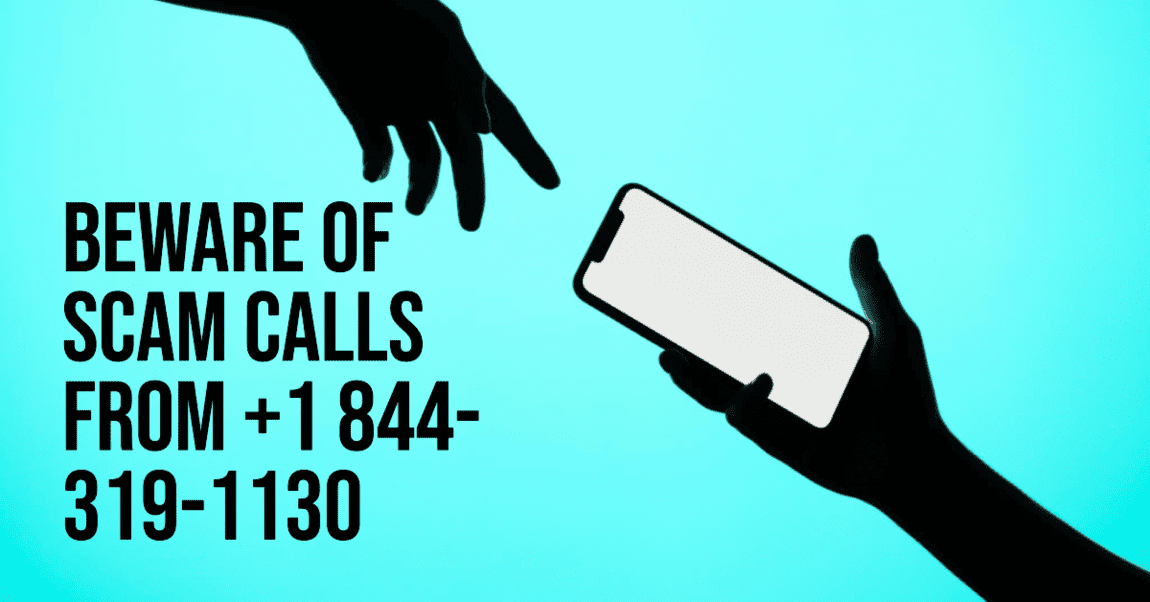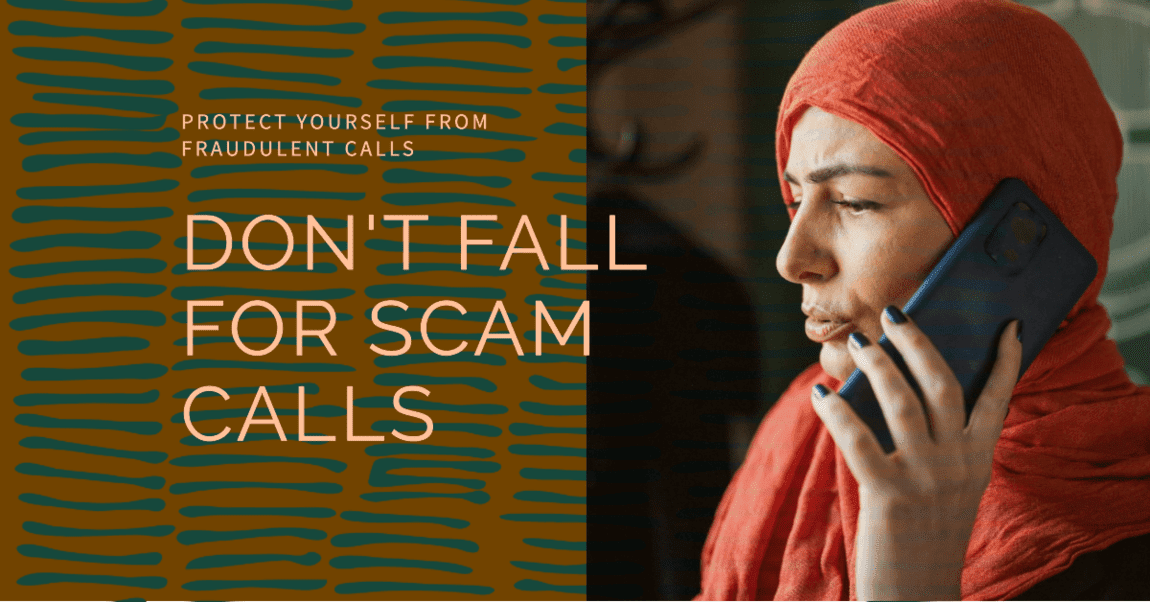In our increasingly digitized society, scam calls are an unfortunate & all-too-common event. These deliberate attempts to mislead & scam people can result in significant financial losses in addition to being obtrusive. One such fraud is the +1 844-319-1130 number. In this TechyNerd post, we’ll go over this scam in further detail, providing you tips on how to recognize it and, more importantly, how to avoid it.

What is the 844-319-1130 Scam?
The +1 844-319-1130 scam is a well-known fraudulent scheme in which scammers pose as different authorities or associations, similar to the Internal Revenue Service (IRS) or tech support services. They identify themselves as callers & use the phone number +1 844-319-1130, which appears authentic at first sight. These calls are intended to terrify & deceive receivers into uncovering personal information such as Social Security numbers, bank account information, or credit card information. Scammers may hang victims with legal action, penalties, or indeed arrest to convince them to cooperate.
Why have I received Scam Calls from +1 844-319-1130?
Scammers use this +1 844-319-1130 number, which is fraudulent, to trick people into giving out their private & monetary information. However, account details, & security questions, If you do not give scammers your PIN. Report such a call as spam if you get it, and do not give the other party any private information. They will violate your account & you could lose a lot of money if you do give them your bank information.
Can they hack my phone through these calls?
Scammers can not hack your gadget just by picking up the phone. On the other hand, may use voice phishing, also known as vishing, to fool you into telling your private & monetary information. They may also use text communications to start phishing attacks or other frauds to trick you into telling particular information, transferring funds, or installing viruses or malware.
It’s critical to remember that varied types of hackers are continuously looking for new security holes, making complete protection unattainable. Good digital hygiene is the most effective way to control your internet security & privacy.
Also Read: How Can an Attacker Execute Malware Through a Script? 5 Safety Tips
How to Identify Scam Calls from +1 844-319-1130?

Identifying scam calls originating from the number +1 844-319-1130 is crucial to safeguard your personal information. Scammers often exploit this number, attempting to deceive individuals into disclosing sensitive data. When receiving a call from this number, it’s advisable to report it as spam and refrain from sharing any crucial details. If you’ve already shared personal information, it’s essential to swiftly change your PIN & security question to bolster security.
Key indicators of scam calls from +1 844-319-1130 encompass enticing offers like carrier service transfers and threats to account suspension, often concealing ulterior motives of extracting your PIN, account data, and security questions. Vishing, a form of voice phishing, is also a tactic to be wary of. Stay vigilant against phishing attacks initiated through text messages, often used to extract sensitive data, make unauthorized transfers, or facilitate malicious software downloads. It’s vital to maintain good digital hygiene and proactively manage internet security and privacy in light of evolving security threats.
Detecting potential scam calls is essential for safeguarding your security. Here are key indicators to help you recognize a scam call from +1 844-319-1130:
Unverified Caller ID
Genuine organizations usually have verified caller IDs. If you receive a call from +1 844-319-1130, especially if they claim to represent a government agency or company, exercise caution.
High-Pressure Tactics
Scammers often resort to aggressive tactics, employing threats and demanding immediate action. Be wary if the caller insists on rapid decision-making.
Request for Personal Information
Legitimate entities never request sensitive data like Social Security numbers, credit card information, or passwords over the phone.
Incoherent Communication
Scam calls may lack professionalism and coherence, with callers having heavy accents, language difficulties, or providing inconsistent information.
Verify the Caller
When unsure about a call’s legitimacy, it’s wise to disconnect and independently verify the organization or agency’s contact details the caller claims to represent. This practice helps ensure your safety and privacy.
Also Read: 7 Ways to Troubleshoot “The Number You Have Dialed Is Unallocated” Error
Why are Scam Calls So Prevalent?
Scam calls persist due to their cost-effectiveness and simplicity. Scammers exploit technology for making inexpensive robocalls via the internet. Voice phishing or vishing is a common technique, deceiving individuals into revealing personal and financial information. Text messages serve as a tool for phishing attacks, aiming to coerce recipients into sharing sensitive data, transferring money, or downloading malware. Scammers employ emotional manipulation and familial ties to persuade victims into sending funds. While complete protection is unattainable due to evolving threats, practicing good digital hygiene and proactive internet security and privacy management remain your best defense. Stay vigilant to thwart potential scams.
Scam calls, like the +1 844-319-1130 scam, remain widespread for several reasons:
Anonymity
Scammers frequently employ spoofed or untraceable phone numbers, evading law enforcement detection.
Low Cost
Scammers can initiate scam calls at minimal expense, enabling them to target a broad audience for potentially significant gains.
Lack of Awareness
Many individuals are unaware of the numerous circulating scams, rendering them more susceptible to deceit.
Fear and Intimidation
Scammers resort to fear tactics to coerce victims into compliance, exploiting the vulnerability of those who believe they are in legal trouble.
Also Read: The Finest 8 Methods: How to Unlock SIM Card Without PUK Code?

How to Know If a Number Is Spam or Real?
Identifying spam calls is crucial for your safety. Here are some useful tips:
Reverse Phone Lookup
Utilize a reverse phone lookup service to unveil the caller’s identity and verify legitimacy.
Area Code Scrutiny
Stay vigilant about area codes; scammers often use fake ones to appear local. If unfamiliar, let it go to voicemail.
Beware Unsolicited Offers
Exercise caution when receiving unexpected, too-good-to-be-true offers. Scams promising free vacations or lottery wins are typically fraudulent. Stay informed to protect yourself.
Also Read: How to Get Rid of Ultra Search Engine: 7 Effective Steps
How to Protect Yourself from Scam Calls?
It is critical to protect oneself against the growing wave of scam calls. Here are some safety tips:
Unknown Numbers on Screen
Allow unknown phone calls to go to voicemail; legitimate callers will leave a message.
Personal information should be kept private
Never give up personal information over the phone, especially if the call is unwanted. Be careful with your Social Security number, bank account information, or other sensitive information.
Maintain Your Scepticism
Be wary of unusual, too-good-to-be-true offerings. Scammers take advantage of promises of free holidays, lottery winnings, or awards.
Trust Your Gut Feelings
Hang up immediately if a call feels unpleasant or pushy.
Suspicions should be reported
Call the FTC at 1-888-382-1222 or file a complaint online at reportfraud.ftc.gov.
Apps for Call Blocking
Investigate call-blocking apps & software that detect & prevent incoming scam calls. Your safety is of the utmost importance.
Also Read: Best Android Calling Tips: How to turn off RTT on Android & iPhone in 4 steps
Final Thought
Scam calls like the +1 1844-319-1130 scam are regrettably a part of the equation in the present digital terrain. Your mindfulness & alertness, still, can act as a defense against these evil schemes, guarding both you & your loved ones. Always exercise caution when telling particular information, confirm the frequenter’s legality, and notify the applicable authorities as soon as possible.
Still, do not vacillate to communicate with us, If you have any questions or would like further information on how to protect yourself from scams like +1 1844-319-1130 scam class . I am then to offer support & direction.
FAQ’s
Why do I keep getting calls from the 844 area code?
Repeated calls from the 844 area code can originate from telemarketers, legitimate businesses, or scammers. Telemarketers and robocalls often use 844 numbers to sell products or services. Legitimate entities like banks may use them for customer contact regarding potential fraud. Scammers employ 844 numbers to trick individuals into revealing personal information or money. When encountering unknown 844 calls, caution is advisable, and sharing personal details should be avoided.
I received a call from 844-319-1130 claiming to be the IRS. What should I do?
Receiving a call from 844-319-1130 claiming to be the IRS should raise suspicion. The IRS won’t make unsolicited calls for payment or threats of arrest. Avoid sharing personal info, refuse immediate payments, and hang up if uncertain. Contact the IRS directly at 1-800-829-1040 for verification. Report the call to the Treasury Inspector General for Tax Administration (TIGTA) at 1-800-366-4484 or online at TIGTA scam report site.
Are there any legal actions against scam callers?
Legal actions can be taken against scam callers, governed by both federal and state laws. Federal laws like the TCPA restrict unsolicited telemarketing calls, while the Truth in Caller ID Act bars caller ID spoofing. The TRACED Act mandates robocall blocking technology and reporting ease. States have their laws on scam calls. To take legal action, file complaints with the FTC or your state attorney general’s office, or consider a civil lawsuit with legal counsel’s guidance if significant financial losses occurred due to a scam call. Legal consultation is recommended to explore your options.
Why am I getting so many calls from the same area code?
Receiving repeated calls from the same area code can be attributed to various factors, including scammers employing “neighbor spoofing” to appear local. Telemarketers may have your number on their lists due to previous dealings or service subscriptions. To mitigate this, you can register on the National Do Not Call Registry, block specific numbers, report calls to the FTC, or use call blocking apps. However, if the issue persists, changing your phone number may be a viable option to curtail these nuisance calls.

